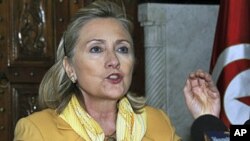U.S. Secretary of State Hillary Clinton said Wednesday the quickest way for Libyan leader Moammar Gadhafi to end the crisis swirling around him is to leave power. Clinton, who held talks with her Moroccan counterpart, claimed "significant progress" in enforcing the Libyan no-fly zone.
Clinton is suggesting that the air campaign, which has halted the Gadhafi government's drive against rebels, also has prompted debate within the Libyan ruling circle about how to end the crisis.
At a joint press event with Moroccan Foreign Minister Taieb Fassi Fihri, Clinton said the Libyan leader "has decisions to make" and that the quickest way to halt the violence is for him, in her words, "to actually serve the Libyan people by leaving."
"It will be up to Gadhafi and his insiders to determine what their next steps are," said Clinton. "But we would certainly encourage that they would make the right decision, and not only institute a real, comprehensive ceasefire, but to withdraw from the cities, end the military actions and prepare for a transition that does not include Colonel Gadhafi."
Clinton said the coalition air campaign enforcing U.N. Security Council Resolution 1973 already has achieved significant progress.
She said while pro-Gadhafi forces were poised last weekend to enter the rebel stronghold of Benghazi, putting hundreds of thousands of people at risk, they have been pushed back and the government's military capabilities downgraded.
"I know that the nightly news cannot cover a humanitarian crisis that, thankfully, did not happen. But it is import to remember that many, many Libyans are safer today because the international community took action. Now, of course, challenges remain so long as Gadhafi continues to direct his forces to attack his own people, so the United States will continue to support this mission as we transfer command and control to NATO."
Moroccan Foreign Minister Fihri, whose government strongly supported the U.N. resolution, said it did so because of the bonds between the peoples of Morocco and Libya, and a desire to see Libya united, under democratic rule.
"It's not an occupation. No one wants to see Libya divided into two or three parts. It's not a question of partition, but a situation to protect the civilians. And for that there is the military aspect, and there is, which is very important also, the humanitarian aspect," said Fihri.
Clinton paid tribute to the political reform initiative of Morocco's King Mohammed the 6th, which the Moroccan ruler expanded earlier this month, and which Clinton said can be a "model" for other countries in the region facing unrest.
She also reaffirmed U.S. backing for Morocco's autonomy plan for the Western Sahara, a coastal North African territory largely controlled by Morocco, but also claimed by Mauritania and an Algerian-backed rebel movement.
Clinton: Gadhafi Can End Crisis by Yielding




